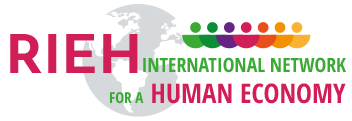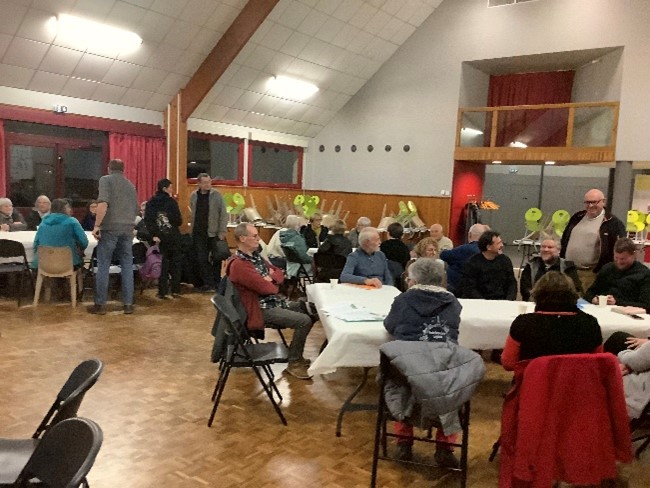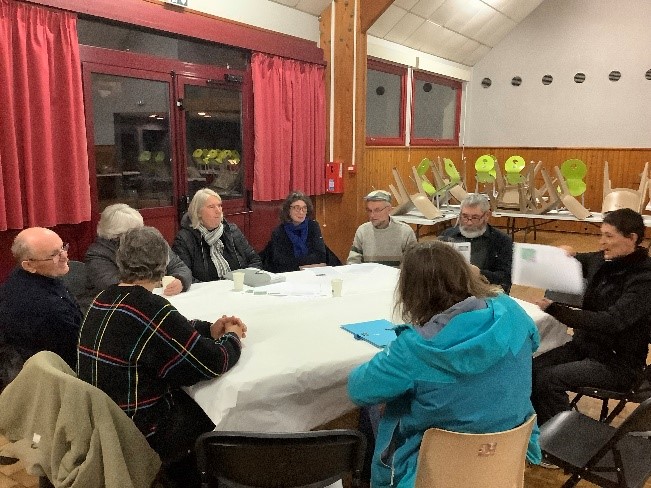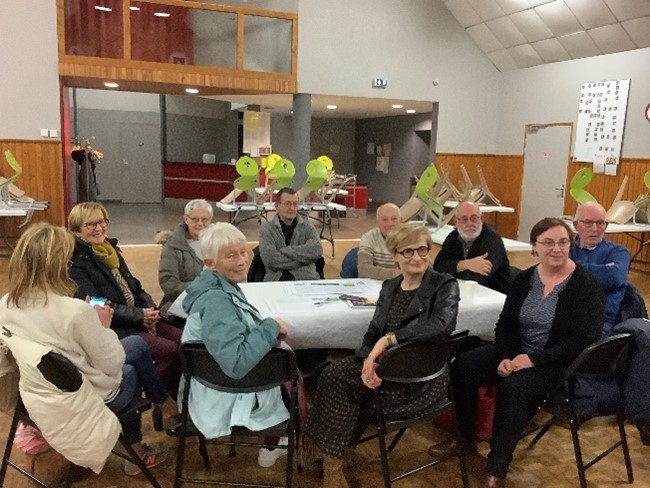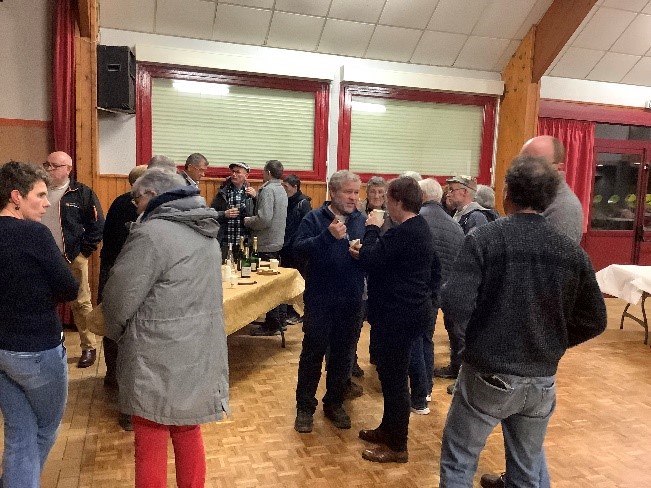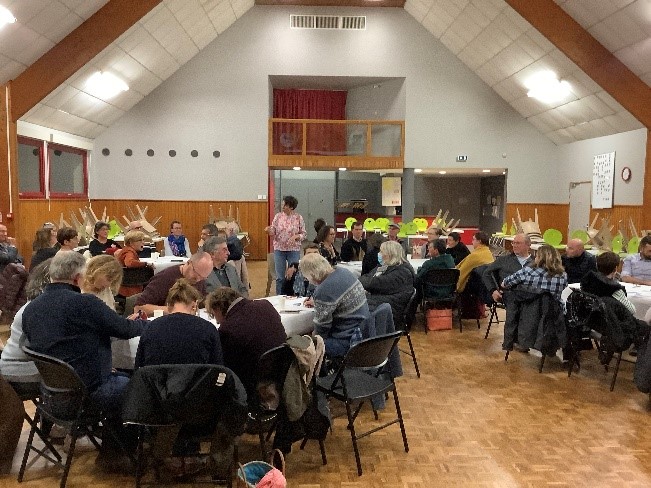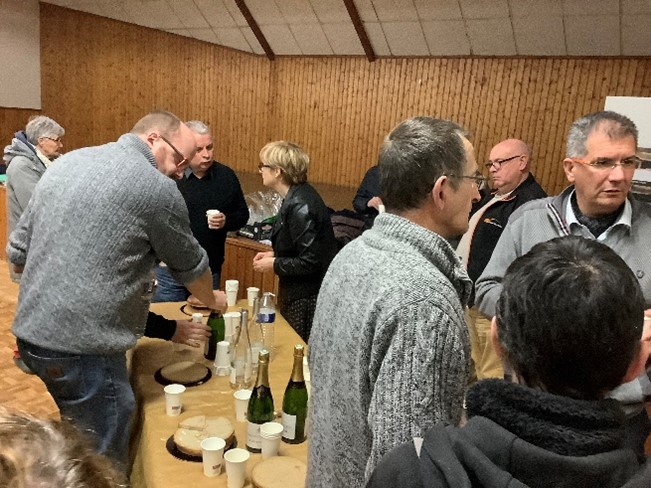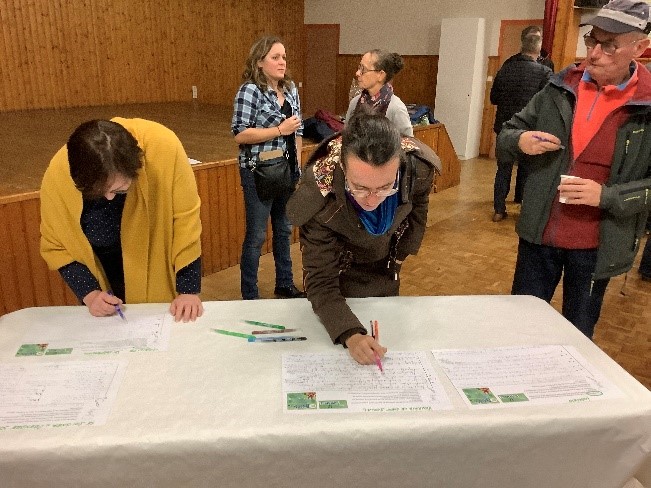Toutes les actualités (EN)

Le Mené, always a pioneer...
"The future can't be predicted, it has to be built!"
Vous pouvez accéder à ce contenu en Français en cliquant sur ce lien : 
The town of Le Mené in Brittany hosts the office of the international secretariat of INHE, because for over fifty years it has been a territory on the road to Human Economy under the impetus of Paul Houée, who was very close to L-J Lebret. See the book Paths towards Human Economy. After a period devoted to organising the merger of 7 communes, the territorial dynamic has just been relaunched.
Marie Grippaudo, who is in charge of communications for INHE, lives in the commune and has been very committed to her region for many years, gives an account of this relaunch.
This was the slogan used by the Le Mené municipal team, led by Isabelle Le Gall (Director General of Services) and Florian Grass (Sustainable Development Officer) and chaired by Gérard Daboudet, the town's mayor, to invite residents to get together and discuss their daily living environment.
On Friday 17 November, in the Saint-Gouéno village hall, around fifty people from all over the commune responded to the call: associations, local authority staff, tenants, owners, farmers, employees, elected representatives, people who have been involved for a long time; however, whatever their status, they were all curious or invested in the dynamics of the area.
A welcome drink was offered to us, for an initial exchange or reunion, which was much appreciated.
Then, under the guidance of host Roseline Durand from the Atelier des petits ruisseaux, the evening's proceedings were presented, with an initial assessment of the territory's strengths and weaknesses.
Assets
- New commune since 1 January 2016 (investment leverage) ;
- Authentic and natural preserved environment;
- A dynamic energy sector (a pro-active area in terms of energy and ecological transition);
- A very large factory in the area: the slaughterhouse of Kermené is a subsidiary of the E. Leclerc Group since 1978, and a major player in the French food industry. 2,800 workers are employed at the Le Mené site, compared with 4,000 at the group's 7 other sites, all in Brittany;
- A low unemployment rate;
- A positive migratory balance;
- 128 vibrant cultural and sporting associations;
- Le Mené, a key local centre within the LCBC Communauté de communes de Loudéac Communauté Bretagne Centre. Le Mené has a proven track record of working together, thanks to its archipelago configuration, which has required commitment and participation from each of the 7 market towns. The competence of the Le Mené commune puts into perspective what the 42 communes of LCBC must achieve together: a strong common identity, it while retaining the culture of each. It is an example of action;
- School services and the presence of an ESD-labelled secondary school. The "E3D" label, which stands for École ou Établissement en Démarche globale de Développement Durable, was developed by the French Ministry of Education to recognise and encourage schools and educational establishments that are committed to a comprehensive approach to sustainable development;
- From a health point of view, an area recognised through the ZIP (Zone d'Action Prioritaire) scheme;
- Dynamic employees who are committed to their work;
- The emergence of a group of residents motivated to get involved in the Loudéac Communauté Bretagne Centre community of municipalities.
Weaknesses
- At 163.23 km2 in length, Le Mené is reputed to be the largest in Brittany. Situated in the extreme north-east of the Community of Communes, Le Mené is somewhat isolated and poorly served, particularly within the LCBC territory;
- Successfully consolidating the new commune from an identity point of view, it was born out of the transformation of the Le Mené Community of Communes into a new commune in 2016. As a result, the historic communes of Collinée, Langourla, Le Gouray, Plessala, Saint-Gilles-du-Mené, Saint-Gouéno and Saint-Jacut-du-Mené were "merged";
- Health services available, but under pressure;
- An ageing population;
- Fewer people working in agriculture, where there is a need to relocate farming and food production. Existence of a PAT LCBC (Territorial Food Plan);
- Little agricultural diversification in the area;
- Various tools piloted by LCBC PAT: territorial food projects aim to unite the various players in a given area around the issue of food, thereby helping to take account of the area's social, environmental, economic and health dimensions; PCAET: a planning tool that is both strategic and operational, enabling local authorities to address the whole range of air-energy-climate issues in their area; CRTE: Territorial Contract for Recovery and Ecological Transition;
All these national plans, absolutely essential in their implementation, lack simplicity in contacts. Organisational difficulties are still ongoing...
- Housing: ageing housing stock (fuel poverty);
- Ensuring the integration of allophone populations (whose mother tongue is not French) and vice versa to promote living together (more of a vigilance than a weakness).
The participants were then invited, according to their areas of interest, to take part in a round-table discussion on the living environment of its residents on a daily basis. 5 themes were chosen: Health, mobility, living together, shops and housing.
At each table, participants were free to express their views, based on their own experiences. A person appointed as "rapporteur" led the debate, and the results were then fed back to the group.
To complete the picture, the same exercise was repeated during the second workshop, which took place at the same time and place on 7 December.
New themes were raised around the ecological and energy transitions in the local economy:
Energy and the environment: - What new direction should the town set for itself in the future? - What actions and projects have been launched to continue Le Mené's pioneering approach to energy? - How can we raise residents' awareness of the challenges of energy transition? - How can we promote and care for the local environment?
For agriculture and food: - How can we maintain agricultural activity in the municipality in the future? - How can we encourage the establishment of high value-added agriculture? - How can we create more dialogue between farmers and residents? - How can we reduce the impact of farming on the climate, water resources and biodiversity? - What food policy should we choose for our children and elderly? - Helping local people to eat well.
For shops and services: - How can we maintain the fabric of shops and services in the face of the rise of online shopping? - What shops and services are missing in Le Mené? - What alternatives can be put in place to maintain a local economy in rural areas? - How can we support local people who are jobseekers (particularly allophones)?
3 tables are looking at the changes that need to be made, revealing the constant concern for territorial dynamics in the commune. A time for reflection that will enable us to exchange ideas and update information on what has already been achieved.
A full report will be provided by the organisers: the municipal team and the commissioned agency "les petits ruisseaux", run by a former member of the MIR Association. As a reminder, MIR (Mené Initiative Rural) was created in 1997 by farmers, in the wake of the Salon des Fourrages, organised in 1995 in Plessala. It has brought the Mené region to life and raised its profile through its various events, particularly those dedicated to the environment in the Côtes d'Armor. With a reputation as the commune's "itching powder", it worked with the elected representatives of the time to seek out, develop and install renewable energies as part of a real regional dynamic, and even became a forerunner at national level. An exceptional human adventure that has left its mark on the history of the region.
In conclusion, the aim of this citizen participation in the residents' workshops is to feed into the discussions and projects led by the municipality's elected representatives. It's an approach that has often been tried and tested in Le Mené, at key moments in its history. In this way, residents can share and learn from each other, become active players, gain confidence in their abilities and feel useful to the community in their role as citizens.
Collectively, the approach helps to create a local dynamic while sustaining the involvement of local residents. It facilitates action and fosters trust, proximity and conviviality between participants.
Marie Grippaudo
Head of INHE’s Communication
A resident of Le Mené, committed to her region

BYE BYE Fr. ANTOINE SONDAG: A TRIBUTE
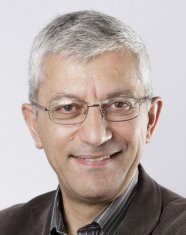
We at INHE-Asia Secretariat are sorry to share with you all that Fr. Antoine Sondag is no more. He passed away in France last week. Readers of the DCLI and RIEH (INHE) publications would have known Antoine through his editorials
and his 'Libres Propos'. Unfortunately a victim of prolonged illness, Fr. Antoine was Editor-in-chief of RIEH(INHE) magazine ‘Development & Civilizations’ for more than 10 years, which is distributed around the world. Fr. Antoine Sondag had kept an enlightened eye on world affairs, especially on developing countries, of which
he had in-depth knowledge and recognized expertise. In our publications, he made sure to introduce people from all backgrounds who have rich experiences of what a ‘human economy’ can be. His critical sense of things inspired everyone to reflect, dialogue and engage their thoughts and move forward. We join his loved ones in sharing their grief, saying goodbye to Fr.Antoine and bringing his memories to life.
In Solidarity,
L.A. Samy & N.S. Babu
On behalf of RIEH(INHE)-Asia
Antoine Sondag, a diaconal priest
Very sad this week to record and report the death on Saturday 7 November of French priest, Fr Antoine Sondag, a friend for over 30 years, chaplain to the International YCS during the late 1980s and to Pax Romana ICMICA some 20 years later.
Born in 1948 at Sarraguemines near Metz in France's Lorraine region, now part of the Grand Est, Antoine later graduated from the elite Institute of Political Science in Paris, better known as "Sciences Po" to its students.
Quickly, however, he took another path, entering the seminary and being ordained as a priest for the Diocese of Metz, where he served in a parish for ten years.
I believe that it was there that he became involved as a chaplain with the Jeunesse Etudiante Chrétienne (Young Christian Students) movement.
By the time I met him in Hong Kong in 1989, he was chaplain for the International YCS.
But I really got to know him and appreciate his friendship and generosity later when I studied and worked in Paris for several years.
By then, he had become secretary-general of the French bishops National Commission on Justice and Peace. Later still he worked for Secours Catholique (Caritas France) as the head of its research department.
Following that he returned to the French Catholic Bishops Conference as the director of their "mission universelle" or international affairs department.
In 2011, he joined us in Bangkok as the keynote speaker for a peace-building forum hosted by the Cardijn Community International.
More recently he edited "Développement et civilisations," the magazine published by the Centre Lebret-IRFED, which promoted development in line with the work of the Dominican, Louis-Joseph Lebret, who had founded the jocist-inspired specialised movement for young maritime workers before making his name as a development specialist and the inspiration of Pope Paul's encyclical, Populorum Progressio.
At an intellectual level, he published a number of books dealing with subjects ranging from the demography of the Catholic population to the question of poverty.
One of his most hardhitting books bears the title "On ne supprimera jamais la pauvreté. Même pas vrai" - "We will never get rid of poverty. Totally untrue." In a similar vein, he also published "La solidarité, chemin de spiritualité" - "Solidarity, a spiritual path."
And finally, "Pour une église diaconale, Chrétiens au service de la société" - "For a diaconal church. Christians at the service of society."
In September 2019 he moved to Villejuif, an inner suburb of Paris, where he became part of the local Catholic parish. By then, however, he knew he had the cancer that would claim his life this month.
Yet he continued to welcome friends from around the world and also to financially assist those in need.
Aware of his probable fate, Antoine took the opportunity to record a remarkable video that I will post here for those who understand French and which he divides into three parts: thanks, pardon and hope.
I have translated it into English here.
Indeed, just five days after his death, his "testament" has already been translated into over ten languages including Arabic, Chinese, German, Spanish, Italian, Filipino, Tamil, Vietnamese, Indonesian.
It is a fitting tribute to Antoine's quiet yet powerful influence and impact.
Meaningfully, indeed providentially, his funeral will take place tomorrow, 13 November, which is also Cardijn's birth anniversary as well as "IYCS World Day."
As his Villejuif parish colleagues noted, he "placed himself in the line of the Catholic social doctrine developed by Frédéric Ozanam during the 19th century."
In an age that has grown tired of an authoritarian, clerical, top-heavy Church, Antoine Sondag showed us what it means to be a truly diaconal priest at the service of his people and offers us a model of how to build a genuinely diaconal Church.
Stefan Gigacz
READ MORE
A Dieu (Joseph Cardijn Digital Library - in 10 languages)
A Dieu père Antoine (Eglise de Villejuif)
IYCS World Day (IYCS-JECI)
Guido Mocellin, Un testamento spirituale in Rete: i «grazie», il perdono, la speranza (Avvenire)
Fr Antoine Sondag (Online celebration 21 November) (Pax Romana ICMICA)
Décès du Père Antoine Sondag (Diocèse de Metz)
L'adieu d'Antoine Sondag (Secours Catholique)
Antoine Sondag funeral details and live broadcast (Diocese of Metz/Facebook)
Labels: Antoine Sondag, ICMICA, JEC, Louis-Joseph Lebret, Pax Romana, YCS.
commentaire(s) (0) | Ajouter un commentaire
AREDS Team Lockdown escalates Humanity in India
The burning issue of the world today is COVID-19 which lays its deadly hands on people across the countries indiscriminate of nationality, color, creed and religion. As corona deaths started increasing day-by-day, all nations-imposed quarantine and lockdown. India also imposed lockdown to fight out corona menace. However, imposing lockdown all of a sudden in a nation, where economic disparity is high, will create chaos only. Without an iota of concern about the hawkers, street vendors and petty traders and about the migrants, Tamil Nadu state government-imposed lockdown and it was like a bolt from the blue to the workers of unorganized sector.
As the entire Tamil Nadu shut down, the unorganized workers - majority of them are casual laborer’s - had no employment opportunities and no source of income. Later, Tamil Nadu state government announced a few packages of relief measures. But they were not truly helpful to the working population. It announced the distribution of Rs.1000 to every family card holder. Marginalized people, daily wage laborer’s and old people cannot make both ends meet with just thousand rupees at a time when price hike is soaring.
The instant the good hearts feel the situation, they voluntarily came forward to lending a helping hand by all means. When the government socially distanced itself from the reality and the poor people, individuals and social service organizations mobilized fund somehow and procured essential groceries and supplied them to the needy people. AREDS supplied a package essential grocery to the economically poor and handicapped at the grassroots level and to the migrants who were left alone on the streets in Karur district.
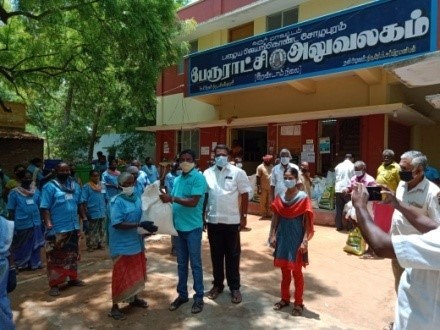
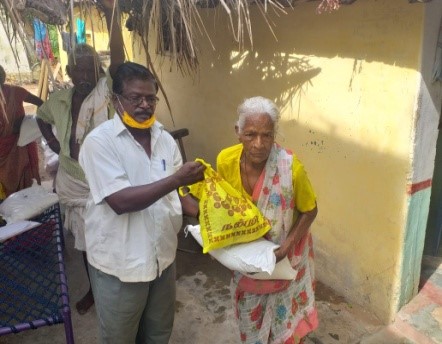
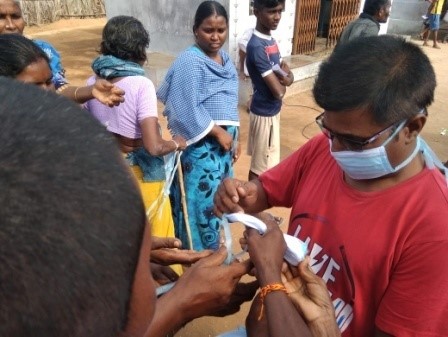
As soon as the government of India announced an ex-gratia amount of Rs.500 to poor, destitute and deserted women and widows, AREDS staff flung into action to see to it that the benefits reach the potential beneficiaries. On the one hand, we have been appealing to the PM and the government through letters to take proactive action to alleviate the misery of the unorganized workers and to ensure social protection to all; and on the other, we make full use of the government’s mission to help out the people, who are the most vulnerable in this time of lockdown. The people in solidarity with us in 20 districts helped the most deserving people get the ex-gratia amount disbursed by Tamil Nadu government.
The plight of migrants
Internal migration is common in India because of the mode of economy followed by the government. Relatively, as far as the socio-economic and cultural development is concerned, the southern states of India are better than the northern states. Though big industries, mega projects and major mines are being operated in the northern states, social condition, educational status are very poor there. Hence, unemployment crisis clubbed with illiteracy force the people to migrate to other states, the southern states in particular, in search of livelihood.
Since work force is available aplenty, the employers of host states hire people at low wages and exploit their labour power without any timeframe. Knowing that what they get as wages in other states is higher than what is paid in their native places, the migrants work without any resentment or complaints. Sometimes, they fall victim to the illegal measures of the greedy industrialists and realtors. In Chennai an eleven-storied building collapsed, killing nearly hundred migrant workers, while it was under construction violating the legal norms.
Generally, the migrant workers do not have valid identities like family card, adhar card and the like. As a result, they were certified as illegal immigrants and the claims of their wards or relatives are proved null and void on legal ground. Their situation becomes much worse in the time of natural disasters, communal violence and curfew imposed by the government.
Journey home amid lockdown
Indeed their condition was awfully pathetic during the lockdown period announced by the government for fighting against the corona virus. Blessed are those who owned houses to stay or who stayed in rented houses. When the city, towns and villages shut down, migrant workers were left alone in the streets. They had no options as they did not have any money with them. Many of them were not paid for the work they had done months before the industries, factories and foundries came to a halt. As they had no employment opportunities, many of them were thrown out their rented houses.
Hence, they were left with only option of going back to their native places. Unfortunately, the government has paralyzed the motor transports and train services. Reports say that several of them were caught by the police, booked false cases and put behind bars. As they had no legal permission to move out, they either could not stay in the far-off localities or could not go to their native places.
In Karur district also about 50 migrant workers were aspiring to go back to their native places. AREDS staff availed special passes for the migrant workers from the district administration and helped the migrant workers catch the special trains to reach out their respective places.
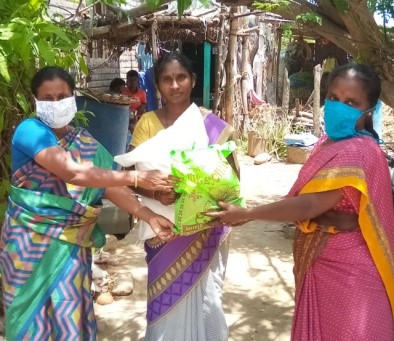
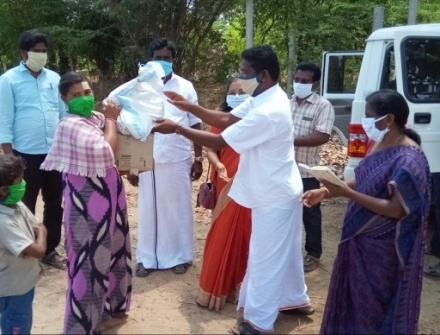
Bridging the producers and the consumers
Farmers had their produce harvested and kept them ready for sale. Consumers were expecting fresh arrival of vegetables and fruits to the selling outlets and to the market. However, during lockdown period, transport was absent and as a result, the movement of agricultural produce came to a standstill. With the relaxation made in the lockdown, the members of FPO (Farmer Producer Organization), promoted by AREDS in Karur district, collected the harvested produce and took them to the markets located in different localities. This way, the FPO members bridged the broken link between the producers and the consumers and restored the social transactions at the grassroots level. Now they realize the greatness of the farmers’ collective in the form of FPO in ensuring and continuing the humanity in the time of unexpected lockdown and social distancing.
This kind of human centered activities has been done by several people and organizations in different parts of Tamil Nadu state. But, accomplishing such activities, in the lockdown period, with a determination to move towards Human Economy is telling.
Contribution of our old interns from abroad
On hearing the lockdown, without further ado, some our students, who were here in AREDS as interns in 2010, from overseas took efforts in every possible ways, mobilized certain sum of money and sent it to us for extending our support to the needy people in the time of lockdown. It is not the quantum of money that matters. What was appreciable was their true concern about the downtrodden masses, who they know well when they were working with ten years ago, and the solidarity they extended. Hence, people around the world keep the Human Economy moving without any halt.
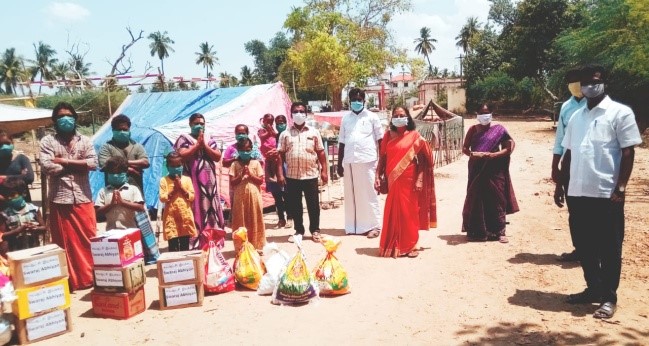
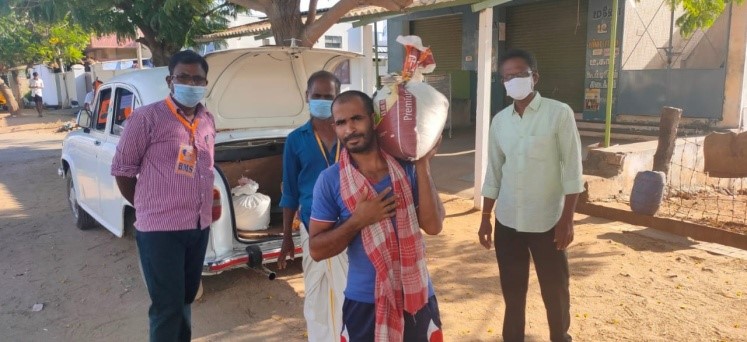
Lessons learnt
In any nation, people, who are socially and culturally connected, lead a healthier and happier life. This social bond is proved time and again whenever natural disasters strike. Though cyclone and flood devastate Chennai every year, the fraternal feeling and the social consciousness of the people remain intact and reinstated. Corona lockdown period also proved the greatness of humanity.
In the midst of social distancing imposed, people voluntarily helped the needy people by various means. As the manufacturing units, work places and trading centres have been closed down due to corona menace, people become unemployed – temporarily or permanently. To deal with the no-income situation, people have learnt many additional works and petty trades and earn money somehow.
As a definite and realistic strategy has not been followed by the government, majority of people are left in lurch and food availability is uncertain to them daily. It simply announced Rs 1000 per month as the lockdown relief fund to every family, with which people cannot make both ends meet. At the same time, the government did not fail to pay off the regular salary to the government employees. Ironically, those who are leading a comfortable life were also paid the relief fund Rs 1000. Migrant workers were completely ignored.
It is heartening to see the media and the labour unions, cutting across party lines, demand in one voice for the solution to the economic setback of the workers of unorganized sector, construction workers, domestic workers, street vendors, auto rickshaw drivers and sanitary workers in this lockdown period and in the long run.
Even in the time of lockdown and at the time of people undergoing social distancing, oppression against dalits, sexual violence on women and children and custodial killings take place on the one hand. On the other hand, the government is enacting anti-labour laws making use of the situation, when people could not come forward to protest en masse. However, people, irrespective of caste and religion, extend helping hands to safeguard the lives of millions of poor people, who have been ignored by the government at the time of dangerous pandemic disease strikes the world. Corona virus kills people but people escalate humanity for vying and surviving it.
INDIA AREDS TEAM / INHE ASIA
commentaire(s) (0) | Ajouter un commentaire

Covid-19 ** HDO in SRI LANKA ** “The global health of a society depends on the health of its poorest people
Human Development Organization (HDO) - Sri Lanka

The Human Development Organization (HDO) in Sri Lanka is a member organization of the RIEH, working in particular with agricultural workers on tea plantations. People standing up and reacting! to defend a vision of the world in solidarity. It is about understanding how the system works and how it creates exclusion in order to change it. This means creating solidarity and not competition, as of now. In its area of intervention HDO is mobilizing all the stakeholders to act on the different aspects of the fight against the pandemic.
We live in an unexpected time on the globe. The beginnings of Covid-19 and its accelerated spread not only led to the declaration of a global pandemic by the WHO, but also highlighted the fragility of health services and the powerlessness of the world's most vulnerable populations, exacerbating the inequalities that already exist in society. We share some excerpts...
The Human Development Organization (HDO) has initiated a number of immediate measures to combat the Coronavirus in the Central Region. These are :
Support and solidarity with health clinics.
HDO has received a number of requests from the Regional Director of Health Services, Nuwara Eliya and Kandy Districts, Medical Officers of Health and government authorities to provide them with medical and Personal Protective Equipment (PPE) for use by doctors, nurses, public health inspectors, public health midwives, health workers, etc. Although equipment is scarce in the market, HDO is able to procure or produce PPE even during the curfew periods: face masks, gloves, hand washing disinfectants. This equipment has been delivered to the Nuwara Eliya Health Centre, the Kandy Health Centre, Ministry of Health officers in Maskeliya and Galaha, district secretariats, divisional secretariats, and police stations in the Kandy region. Thanks to the Fondation Médecins du Monde (Doctors of the World Foundation), France for supporting this initiative.
Raising public awareness.
At this point, we, the civil society organizations and the general public, come together as one family and as a country as a whole to respect and support the decisions taken by the government. Together with the authorities, we have identified the populations least informed about the disease and the protection measures: the tea plantation workers' community, rural women, workers in the informal sector, migrant workers, children. In this context, the HDO organized awareness programmes on Covid-19 through the radio programmes "VIDIYAL" and the Sri Lanka Broadcasting Corporation. The lack of Tamil speaking civil servants is also a challenge, so we are organizing awareness programmes in Tamil language for the benefit of the plantation community and other minorities. The programme reaches the Central, Uva and Sabragamuwa provinces.
For these awareness-raising programs, community volunteers and HDO staff establish and strengthen coordination with the authorities. They provide information on Covid-19, health facilities, government subsidies, delivery of vegetables and food products, etc. for the benefit of the public which is seeking access to public services. The Government of Sri Lanka provides information on the health status of Covid in each district through Media Network and mobile phones.
It also shows how to protect oneself from the spread of the Corona virus through pictures so that illiterate people can easily understand and practice protective measures. In containment zones, family members can easily understand these measures and practice them to stop the spread of the virus and be safe.
However, there is still a need to raise awareness among marginalized groups in their own language. Prevention is better than cure. For this HDO proposes to design, print and distribute information material such as leaflets, posters, stickers, booklets, CDs. HDO staff have already designed posters and stickers.
Capacity building for health workers.
The Covid-19 is a new challenge in the field of health and medicine. Many health workers and volunteers are supporting the health authorities to defeat the Coronavirus. In this regard, we are organizing capacity building trainings for health workers and volunteers from civil society organizations on the technical side of Covid-19 and future challenges for local communities.
Development of cooperatives.
HDO offers a service to put producer-farmers (vegetables, dairy products, food products, fruit, ayurvedic medicines...) in contact with consumers to guarantee quality products at a fair price for the benefit of consumers and farmers. A discussion has been initiated with district secretariats, divisional secretariats, the Department of Agriculture, farmers' groups and community organizations on the construction of a cooperative system. Thus HDO proposes to build a mobile fair market system.
Support for food self-sufficiency.
The International organizations are beginning to fear that the already high number of victims of VIDOC-19 will be worsened by deaths from lack of food, particularly in the world's most vulnerable countries. According to FAO Director-General Qu Dongyu, uncertainty about food availability may prompt decision-makers to take restrictive measures to safeguard national food security.
... In 2007-2008, these measures proved extremely detrimental, especially for low-income food-deficit countries, and thwarted the efforts of humanitarian organizations to procure food for the needy and vulnerable.
... The health effects of the Covid-19 pandemic on some of the poorest countries are still unknown. Yet we can say with certainty that any crisis in food supply resulting from bad policy will be a humanitarian disaster.
In this context, the HDO and Civil Society Organisations propose to support local communities to initiate local food production: kitchen gardens, production of small fruits and vegetables, animal husbandry, support to small farmers, promotion of micro and small enterprises, etc. HDO is in discussion with the seed production unit of the Peradeniya Department of Agriculture on this subject. We plan to provide vegetable seeds to communities in our target areas. HDO is also visiting the plantation community politicians, plantation management and the government to provide the bare land available in the plantations for young people and unemployed families for agricultural production. HDO is seeking generous support from partners and sponsors to carry out the project.
Food emergency.
HDO plans to provide basic foodstuffs to thousands of disadvantaged people, women and children on plantations, day labourers, the disabled, and the elderly who have limited access to basic food grains during this period of confinement. The Organization plans to provide basic services to families during the period of confinement and until the situation returns to normal when people can go out and earn a living. HDO is seeking generous support from partners and sponsors to carry out the project.
INHE ASIA - INDIA ** Covid-19** Open letter to Narendra Modi
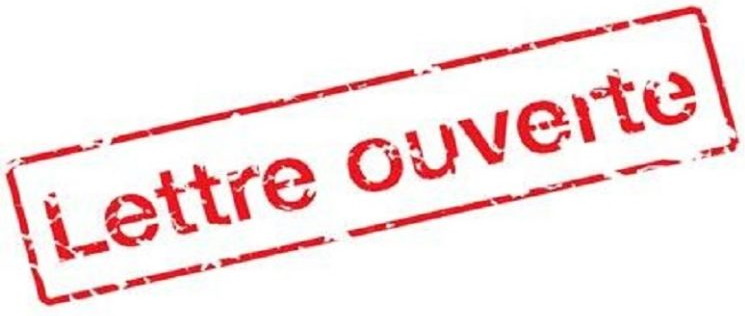
Open letter
“Call for urgent action to provide social protection for all unorganized workers and the most vulnerable. Response to Covid 19”
Our friends of INHE ASIA, continue tirelessly their fight for social security coverage for precarious workers. In these times of Coronavirus, we echo the open letter addressed to the Prime Minister of India: Narendra Modi in the form of an advocacy: "Call for urgent action to provide social protection to all unorganized workers and the most vulnerable. Response to Covid 19".
“ Mr. Prime Minister,
As India grapples with the spread of the new Coronavirus, or COVID-19, the government has taken a number of measures to prevent its spread. More and more companies are asking their employees to stay at home and switch to online working mode. Sports events have been cancelled, colleges and universities have closed their doors and public gatherings have been restricted. We are positive about all the initiatives taken by the Ministry of Public Health and the Government. However, all these support measures lack support for workers in the unorganised sector, who represent almost 92% of the total workforce and who, for the most part, have no other option but to continue working. Daily wage labourers such as seasonal agricultural workers, food delivery workers, taxi drivers, security guards, contract health workers and waste pickers cannot work from home. Domestic workers, construction workers or internal migrant workers have to risk their lives to feed their families and escape from starvation.
There are already cases of domestic workers who have contracted the virus in the workplace and many of them have been asked to go on leave without pay or benefits. 8,000 children in India, as we all know, are starving to death every day. Unorganized workers who stay at home will cause more deaths from hunger than Covid.19 !
A number of governments around the world have taken several social protection measures, including allocating considerable amount of money to protect their people. Cancellation of interest payments by borrowers, provision of food for the needy, postponement of EMIs for their loans, financial support for the self-employed who have to close down their small businesses, extended temporary unemployment benefits, etc.
Spain, has decided to place all its private health care providers and establishments under public control while the spread of COVID-19 continues to take hold of the country.
In the U.S., President Donald Trump and Treasury Secretary Steven Munchin have offered to send cheques of up to $1,000 to American adults. Such an economic aid package was overwhelmingly passed by the House of Representatives. It is unfortunate that the Government of India has not increased its disaster management fund to meet this pressing need or announced any other economic support to the poor who are losing their jobs.The preventive and health measures proposed and advised by the government will be difficult to implement for millions of people who earn their living through work on a daily basis.
How can the awareness-raising measures proposed by the government be applied to this population that needs to be supported with minimal existential economic social protection? How can the poor and slum dwellers who have little space to walk between the doors of their neighbours be isolated?
We are still waiting for leaders to understand this and chalk out plans for specific projects with preventive plans that take into account the vast majority of the population, precarious workers in unorganized sectors and their families.
Questions arise. Instead of losing millions of rupees to support companies of all sizes, it would be better to allocate a few millions to help these vulnerable people to meet their daily needs.
Some of the Indian state governments have already taken some measures: like the UP government which announced Rs.15,000 assistance to all poor families and the government of Kerala which announced assistance to families not eligible for pensions or employment guarantee schemes.
If they did, why wouldn't it be possible all over India?
That is why we call on the Honourable Prime Minister to take the necessary measures to ensure social protection for all, especially the most vulnerable unorganized workers. In the short term, during the Covid 19 crisis, we call for a minimum of Rs. 20,000 to be sent to all adults of the vulnerable population in India.
As this is not an ordinary disaster, we need to address it not only for the time being, but we need to ensure that all vulnerable populations have access to social protection throughout their lives. It is time for the government to take comprehensive and adequate social protection measures to ensure social security coverage for all.
We therefore also urge you to involve all trade unions and other organizations in the distribution of aid and implementation of social protection measures.
The ILO's call for the benefits of economic progress to be shared by all must be heeded now.
While we appreciate all the measures taken by the government to deal with this pandemic, we hope that the above requests will be considered an urgent need for the current session of Parliament.
We hope that the response can be such that it will initiate efforts to create a more equitable and sustainable health care and social protection system.
Thank you, Prime Minister, for your commitment to take a firm action on our request, which we know is essential. Hopefully."
commentaire(s) (0) | Ajouter un commentaire
Covid-19 / INHE LATIN AMERICA - The (very little) discreet charm of the bourgeoisie…
"In a few months, I will be able to say that I saw born, live and work for 50 years, Villa El Salvador from its foundation on mats to the construction of the towers of Villa Panamericana. In addition, as a teacher, I worked there for many years. I have had dozens of opportunities to live in the mountains and explore the Amazon. So, in the greatest simplicity, living from the essential, I mixed with this population to which I am attached, sharing the lifestyle of the popular sectors, the relationships between families, their culture and some of their personal tastes .
I write these lines in this perspective without any judgment. I'm just trying to share this thought, thinking only of the necessary victory against the virus."
Reflections on information campaigns about the epidemic by Michel Azcueta.
Michel Azcueta lives in Villa el Salvador in the suburbs of Lima, Peru. He actively participated in the June 2018 international meeting held at Le Mené, France.
He sent us a text denouncing the inadequacy of the instructions for preventing the spread of coronavirus to the living conditions of the majority of the Peruvian population. He calls for the rules for fighting the epidemic to be drawn up with the population, as was successfully done in Villa el Salvador to defeat cholera. This is one of the principles of human economy: "working with the people”.
We have been suffering for more than four weeks from the outbreak of the now famous coronavirus. Daily activities, conversations, news, images of streets and people, statistical tables are practically the same in the media of the different countries of the world. In Peru, we cannot escape it. But it seems to me that, although everything is the same, neither the senders and makers of these messages nor, of course, the recipients are the same.
Let us look at some examples from those weeks in Peru, messages that we all know.
1. The first one, the most broadcast news item at all hours: "WASH HANDS FREQUENTLY ALL DAY FOR AT LEAST 30 SECONDS", in a country where less than 50% of households have water at home...!!!!
How many of them have large, clean and separate towels for each member of the family?
2. "When you come backhome, leave the shoes outside, put on the clothes you used in the washing machine at 60 degrees and change your clothes. We think we're dreaming! How many Peruvians have two or three pairs of shoes ready? How many have a separate place at the entrance of the house? How many people in Peru have a washing machine or electricity?
3. "IT'S A GOOD IDEA THAT ONLY ONE PERSON PER FAMILY GOES OUT TO DO THE SHOPPING! "By God... !!! Which families are they talking about? They don't know Peru? They don't know the immense daily work of mothers who have to do everything at the same time and who don't have another person to entrust their children to do their work? Don't they know the times when most men, husbands or not, come home? Are they unaware of the endearing, useful but dangerous work that many adolescents do in middle-class homes?
4. "KEEP ONE AND A HALF METRE OR TWO METRES DISTANCE IN THE QUEUES" Very good recommendation ... but it is wrong to say that those who were going to receive the grant of 380 cents they really need, woke up, left before 5 o'clock in the morning, and were fighting in front of the counters. Didn't they know that there are houses where there are only women with children and they have to break the rule to kill the hunger? We could go on like that.
I am afraid that beyond the obvious efforts of President Vizcarra's government team in the fight against coronavirus, the vast majority of the population of Peru will be really affected by the message. Only a small percentage of the urban population will be reached. I have just read in the magazine SOMOS d'El Comercio (dated April 11th) this innocent, charming and discreet sentence: "We have already realized that we can live without luxury, without cars, without designer clothes, without a wallet collection..." written so naturally, even with the best intentions in the world, but... again from the experience of a minority of the population of Peru.
I believe that measures of social isolation and other norms must be differentiated for both the countryside and the city, and that President Vizcarra's team must study the types of social achievements and the production methods in use in rural areas.
The epidemic exists and it must be fought with all scientific, medical, economic, social, police and military methods wherever necessary, but, in my opinion, without the understanding of the majority of the population and without their organised participation, we will take much longer time to defeat it. I am thinking particularly of rural and Amazonian areas and popular urban sectors.
This was done by the people and the community of Villa El Salvador, when the city was the first to defeat cholera throughout the country: with organization, unity, solidarity, leadership and discipline. It is true that we are in another era and that the coronavirus is not cholera, but I am convinced that these values are not only valid but absolutely necessary at this time in Peru.
We Peruvians can do this.
commentaire(s) (0) | Ajouter un commentaire
INHE ASIA ** COVID-19 ** Lettre à nos membres continentaux
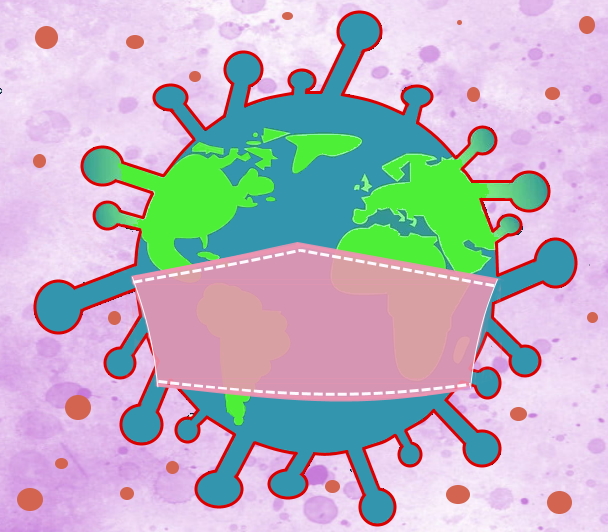
La pandémie du COVID-19 est une crise international qui touche fondamentalement l’organisation de nos sociétés. Les membres de INHE Asia (RIEH Asie), sont fortement interpellés dans leur mission. Cette pandémie traduit un sujet important de l'économie humaine, c'est-à-dire une façon d’organiser la société, d'où qu'elle soit dans le monde, pour relever les enjeux auxquels elle est confrontée. En Inde, le confinement peut provoquer des conséquences terribles sur une économie informelle qui repose sur la mobilité, et risque d’aggraver les profondes inégalités qui divisent le pays. Deux facteurs essentiels s'imposent en Inde : le lien social et le mouvement. Deux facteurs nécessaires à la survie et à la protection. Les ravages de la faim où l'emploi informel est la règle plutôt que l'exception et la faiblesse des infrastructures de santé où la protection sociale reste le privilège d'une minorité, menacent... L'ensemble de INHE Asia par l'intermédiaire de son coordinateur Asie : L.A. Samy s'adresse à ses membres. Nous vous livrons ses propos...
Dear Friends, Greetings to you from our INHE-Asia Secretariat! Firstly, we hope that you, your family members, colleagues, partners and friends at your ends are secure and healthy. Please continue to remain safe and take care. The sudden outbreak of the current global pandemic “COVID-19” has posed an unprecedented catastrophe to all of us. You may be aware that none of us were really prepared to deal with the rapid developments of last couple of months, which turned out to be extremely precarious, tumbling the whole world upside down, and spiralling various uncertainties for the future. It is important now that our INHE members and partners all over the world continue to be critically pro-active at this crucial moment of history to protect the wellness of our societies and humanity at large. At the global level, the Corona virus is said to have already infected nearly 3,084,000 people, causing around 212,500 deaths, affecting more than 210 countries/territories and damaging lives of humans to inconceivable levels. The real devastation, both in terms of loss of human lives, material damages, and economic destruction, are feared to be much more than what is being presently projected, observed, recorded or declared. Duration of the absence of remedies to the deep-seated anxieties around the world is bound to have severe impacts on the collective uneasiness, mental health and well-being of the world. The extent of suffering is anticipated to touch historic levels though the exact damage will depend on severity, intensity and the duration of the pandemic. We all have realized already (and some are still realizing) the critical role and the political economy of sudden lock-downs. For the poor, the weak, the vulnerable and the marginalized -- the lock-downs have become a double-edged knife as opportunities for precaution and preparedness were not made available to them. They are virtually in crossroads, stranded in the margins and the edges of lives. Many of us in several territories are engaged in arranging relief materials, essential food supplies, and other emergency needs to them. Some territories across the world however, are being appreciated to have handled the emergency far better than several others. There may be a number of factors that have played significant role in better management or governance of the crisis situation. The governance primarily pertains to containing number of cases, providing efficient medical services to the infected persons, enforcement of medical advisories, ensuring physical distancing, sensitizing people about the predicament and preventive health and hygiene etc. The better management can also be observed in the context of the backgrounds of their socio-political organisations, population size, density, existing health infrastructure and also quick ramping up of the health facilities. However, the pandemic has several other socio-economic dimensions as well, apart from the above mentioned ones based on medical factors. An analysis of the socio-economic dimensions can further improve and enhance our INHE understanding on the possible future responses at global, regional and sub-regional levels. These socio-economic insights can throw greater light on dynamics of spread and transmission, public health response, communication and sensitization about the problem, and required health and hygiene practices, social and community response to quarantine, screening and testing, societal understanding of the disease and related risks, health seeking behaviour, healthcare infrastructure, preventive measures, etc, etc.... Further, the general preparedness and interventions, political will, livelihood and economic repercussions of such pandemic, social trust, global recession, decelerating growth and development, industrial revival, recovery on external and internal trade fronts, employment implications, issues related to migrant labourers and unorganised sector workers, transformations in global economic and political order, changes in behaviour and thinking, experiences of people especially the sufferers, access to social protection, environmental concerns, geo-cultural dimensions, and so on.... also could provided critical insights to our future collaborative responses from the global INHE fraternity. To begin with, we as INHE-Asia need to analyse the problems faced by the common people at our local levels in coping with the current crisis, particularly the poor and weak. So we from the INHE-Asia Secretariat humbly request a brief analysis note now and a detailed analysis report later on this issue from your territories on various interventions. This would also be uploaded in our INHE/RIEH website (www.rieh.org). Some visual images in this context would also be helpful. We completely understand that you and your teams (like most of us) must be totally involved with various emergency relief activities at local levels. However, it is simultaneously crucial and pertinent to harness the innovative responses / traditional coping mechanisms evolved from the grassroots communities in the course of the pandemic onslaught. You may already be aware that the ‘human economy’ perspective anchors itself on the indigenous ways communities organises and governs themselves in a particular territory through critical interventions and collective actions. Our analysis must be carried out in a scientific and systematic manner in the contexts of the ‘human economy’ perspectives. The evidence based action-research analysis on socio-economic dimensions could enrich the understanding of our INHE fraternity to take more informed decisions and respond efficiently to such situations. The analysis should at least essentially reflect the three axis of human economy (each person, the whole person, and all persons), i.e., the process of allowing everyone to equitably meet their material, emotional, socio-cultural and spiritual needs, in solidarity with the participation of everyone, while maintaining the balances of our nature. Such analysis eventually would empower us to realign ourselves to new realities, work-out the renewed plans of actions, and fresh interventions in our respective territories. It would guide us into what could be done in our territories after containment of the pandemic crisis, and to address the problems it has accentuated in the respective societies. Take Care all of you..... Please continue to remain safe and fearless.... And let us not forget that ‘democracy’ is ultimately a system of social relationships of everyone with everybody else that respects the twin principles of equality and individual autonomy, so that everyone becomes responsible to everyone else without the use of threat, fear, and power. If there are characteristics of our society and governance which make us undemocratic, this current crisis should be converted into an opportunity to resolve it and strengthen the well-being of our people. Looking forward to hear from you soon.... In Solidarity, S. Babu & L.A. Samy (INHE-Asia Secretariat) 24/04/2020
commentaire(s) (0) | Ajouter un commentaire

NOS ADIEUX A M. NAGAPAANN, père du Dr BABU SUNDARABA
C'est avec tristesse que nous apprenons la disparition de M. Nagapaan. C'était le père du Dr. Babu Sundaraba, notre webmaster et plus proche collaborateur de Samy, en Asie. Nos pensées accompagnent notre ami et sa famille.
It is with sadness that we learn of the disappearance of Mr. Nagapaan. He was the father of Dr. Babu Sundaraba, our webmaster and closest collaborator in Samy, Asia. Our thoughts are with our friend and his family.
" Dear friends,
A very sad news to share with you. Dr.Sundarababu's father who was 80+ passed away a while ago. He was ailing for some time and he was recovering, but he could not win. He was a cancer patient.
Mr.Nagapaan was a IAS officer who served Tamil Nadu for several years and who has been the instrument for organizing dalit people and advocating their rights. Many of the well known dalit leaders of the present time he had been the mentor.
Kindly pray for his soul rest in peace. Kindly share your condolences and wish him courage.
In solidarity
Samy."
N'hésitez-pas à laissez un message, si vous le souhaitez...
Do not hesitate to leave a message, if you wish ...
commentaire(s) (0) | Ajouter un commentaire
COVID-19 ** INHE ASIE ** NAFSO response
Photo "Small Sri Lankan artisanal fishermen", Copyright CCFD-Terre Solidaire
"NAFSO is a national artisan fishermen movement in Sri Lanka, originally initiated by Caritas and became independent in 1997. Nafso defends artisanal fishing and the economic and social rights of small-scale fishermen.
In response to the coordinator RIEH ASIA asked about the actions on COVID 19, Herman Kumara, leader of NAFSO, answers us :

Mail : Herman Kumara, NAFSO, Sri Lanka 01/05/2020
" Yes, we are safe and we do hope to continue to be safe.
But, the many countries health system cannot cope up the unprecedented health crisis, of course interconnected with political crisis due to neo-liberal policies adopted past 4 decades or more.
Now, it is clear this system cannot move forward unless we protect our food systems, traditional health system, following life patters which were sustainable in practice.
Once we face the challenge, the first thing we did was ran to search food and medicine.
Nothing else. So, it is clear the life of the human beings depend on only we develop health and food systems and put our effort to develop our economies towards that direction. Most of our work in INHE is timely in that sense as we have focused the health and food for the rural communities.
It is again very important, the global economic crisis due to the economic recession and some political decisions China had made would further worsen the system.
So, it is very important we plan for strengthening the rural economies.
Sri Lanka is depending on foreign exchange earnings of export garment products, revenues from domestic servants in middle east countries, and some traditional exports of tea etc. But, what will happen to all these aspects? Most of the factory workers are in a fear of loss of jobs. This is one of a main themes of the May day celebration we attend through digital means. Factory management has informed that there won't be orders hence no job for more than 1/2 of the employees. Most of the European and middle east countries are still not mentioned their ability or inability to provide jobs, but there is a danger. So, our economy will be further collapsed. We are afraid of this situation.
So, in this situation we would like to reiterate the importance of launching our INHE programs, of course we have directed our groups, members to do so but need more systematic way to demonstrate them.
Thank you for the wishes and we wish you all the same.
Stay safe and continue to think how to cope up the current crisis and make it it for the transformation of this society.
Herman
Herman Kumara,
National Convener-NAFSO,
Chairperson- Praja Abilasha Land Rights Network
Board Member- Right to Life HR organization
Board Member -Savistri women Organization
Vice President- SSFSL
Executive Committee Member-SAAPE,
Special Invitee- WFFP "

MINUTES OF THE INHE-BAMENDA, CAMEROON MEETING ON 14th MARCH 2020.
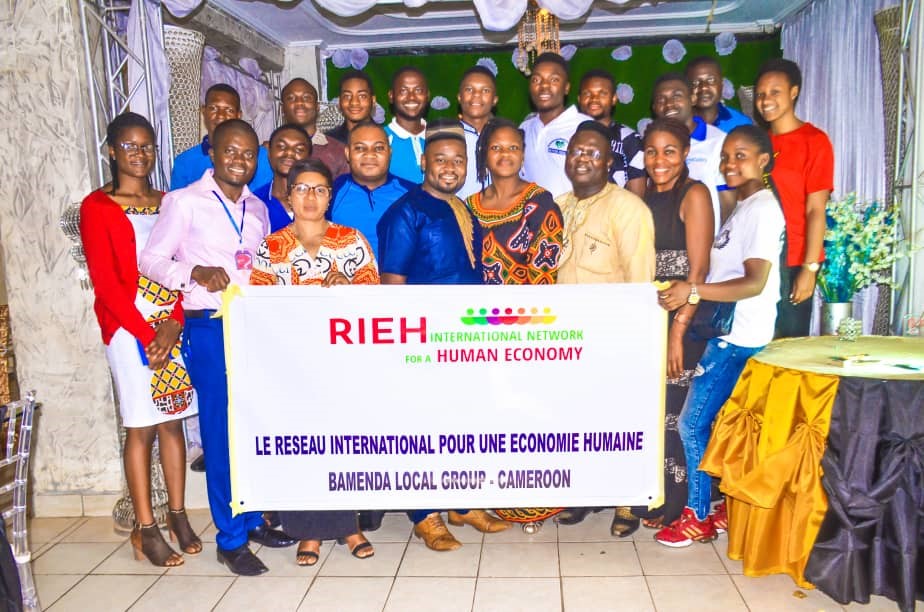 Members of INHE-Bamenda Local Group.
Members of INHE-Bamenda Local Group.
The meeting started at 10:45 am with an opening prayer done by Miss Bih Belvian Chofor of Belvy's home for the elderly Cameroon. Eleven (11) organisations were present for the meeting and cMr. Oju Slyvester from team Didacticians, chaired the meeting. The opening prayer was followed by a word of welcome from the chairman who thanked members for their massive turnout and craved on their indulgence to keep up with the recorded enthusiasm and work towards fostering the concept of the Human Economy in Bamenda, North West region and Cameroon as a whole. Self introduction was then conducted with new members commencing, followed by existing members of the local group. Self introduction consisted of ; the name of the organisation, name of its focal person(s) and the main objectives and activities of the organisation. Worthy of note is that, four (04) new organisations joined the existing organisations of the INHE-Bamenda Local Group on this date, namely :
1) Belvy’s Home for the Elderly
2) Nkwenti’s Foundation
3) DiDA Clothing
4) Pro-Educo Foundation
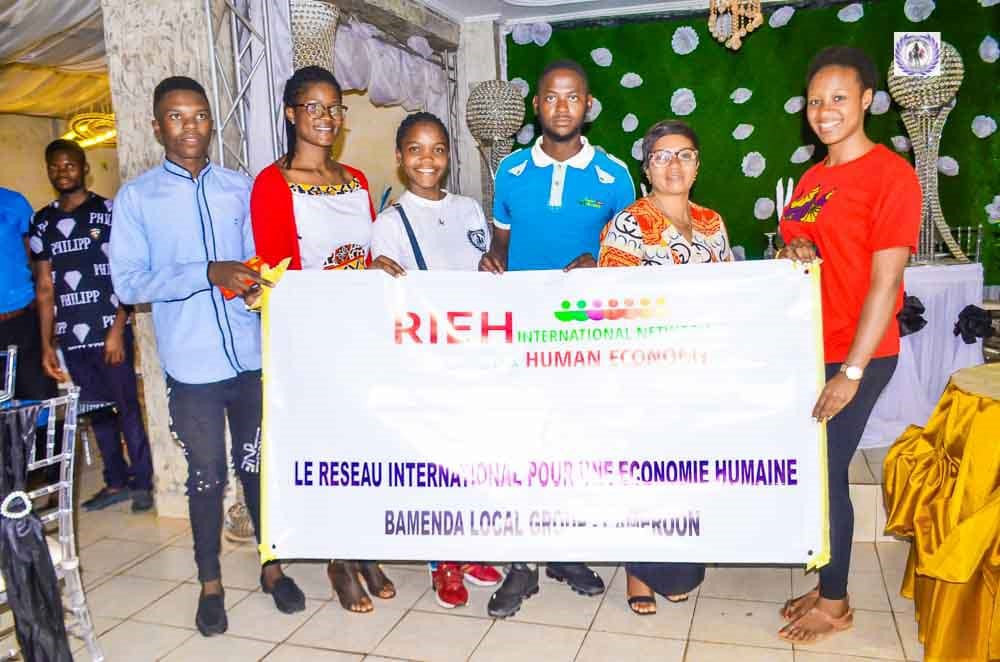 GIC and TeenAlive accompanying the four (04) New Organisations that joined INHE-Bamenda Local Group.
GIC and TeenAlive accompanying the four (04) New Organisations that joined INHE-Bamenda Local Group.
We then moved to the reading and adoption of the previous meeting (launching of INHE-Cameroon, in Yaoundé on the 21st of December 2019). This was merely a formality for the existing members given that they already had the minutes circulated to them and they took part in its adoption before onward forwarding to the head office. However, it permitted the new organisations to be updated on what had happened so far. Next was a presentation on the « Guidance Note on the Operation of an INHE local group » by the team lead of CamCoSO, Mrs Ndi Euphrasia. She expatiated on the translated (into English) version of the « Note d’orientation pour le fonctionnement d’un Groupe local du RIEH ».
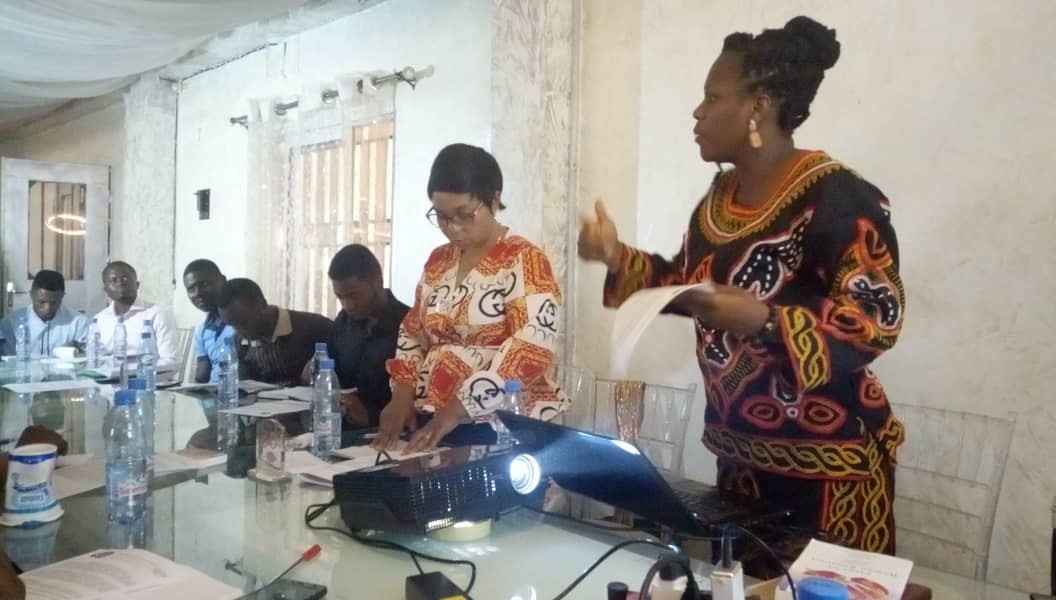
Sixth on the agenda was Elections and thereafter installation of the governing officials of INHE-Bamenda Local Group. The elections were coordinated by TeenAlive and MAYA, while Team Didacticians and Rural Doctors handled the installation of the elected officials. Strict reference was made to the local group governing constitutions as recommended in the ‘Un Groupe local est doté de’ subsection of the « Note d’orientation pour le fonctionnement d’un Groupe local du RIEH ». Below is the list of elected officials and their posts of responsibility ;
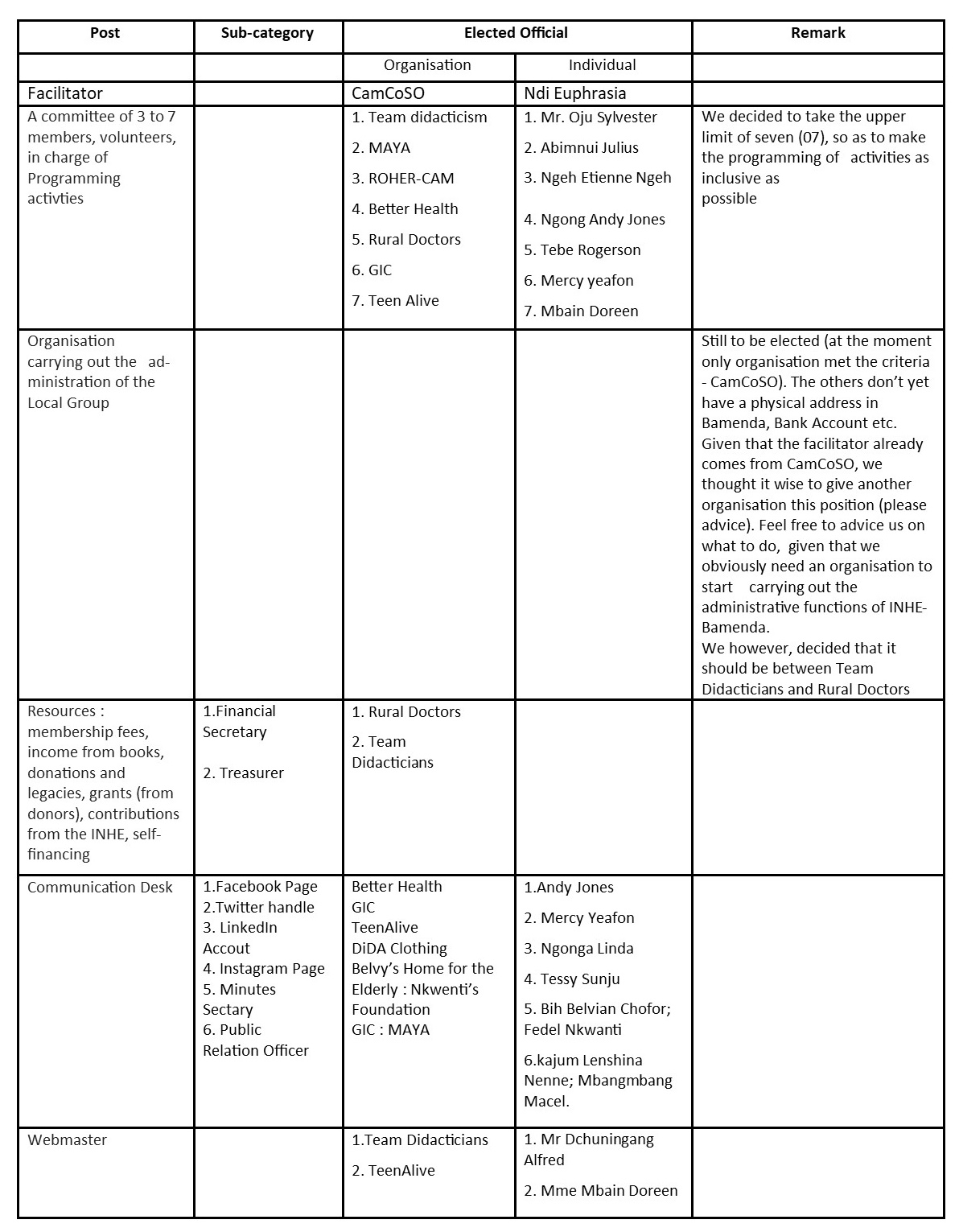
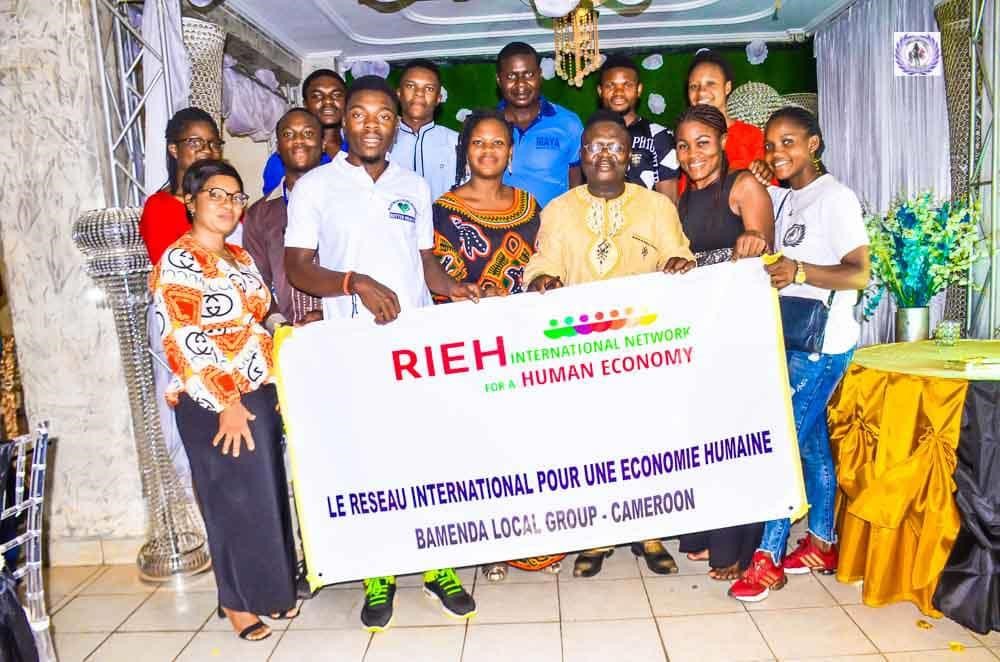 INHE-Bamenda Local Group Elected Executives
INHE-Bamenda Local Group Elected Executives
The meeting rounded up with a closing remark from the chairman, photo taking and refreshment.
NB: It was unanimously agreed that; item 8 - Action plan for 2020 and beyond, be taken home as a assignment to be deliberated upon in our respective organisations and discussed concretely in our next meeting.
MAHATMA GANDHI

02 October 2019 marks the birth anniversary of Mohandas Karamchand Gandhi, also known as “Mahatma” Gandhi. To commemorate this 150th birth anniversary of Gandhi, students are to lit solar lamps and take a pledge of non-violence towards the environment. It is expected that more than one million students in 60 countries will join this global event. Gandhi was born on 02 October, 1869 at Porbandar in Gujarat, India. Over 11.5 million students from more than 50,000 schools in Gujarat state have planted 15 million saplings since June 15 as a tribute to Gandhi.
Considering the present scenario in India as well as around the world, Gandhi’s views on non-violence will be most relevant to talk about now. The United Nations General Assembly on 15 June 2007 had declared the 2nd October as International Day of Non-Violence. Gandhi's philosophy of non-violence remains sage advice in a world where differences are more easily amplified and people take offence more readily. During India's struggle for freedom, he showed the world that freedom can be achieved peacefully through the path of non-violence. Gandhi won rights for nearly 75,000 Indians living in South Africa. He achieved this without violence. Gandhi firmly believed that people could never win their rights through violence. He used new form of protest "Satyagraha" - derived from the Sanskrit words meaning "truth" and "force."
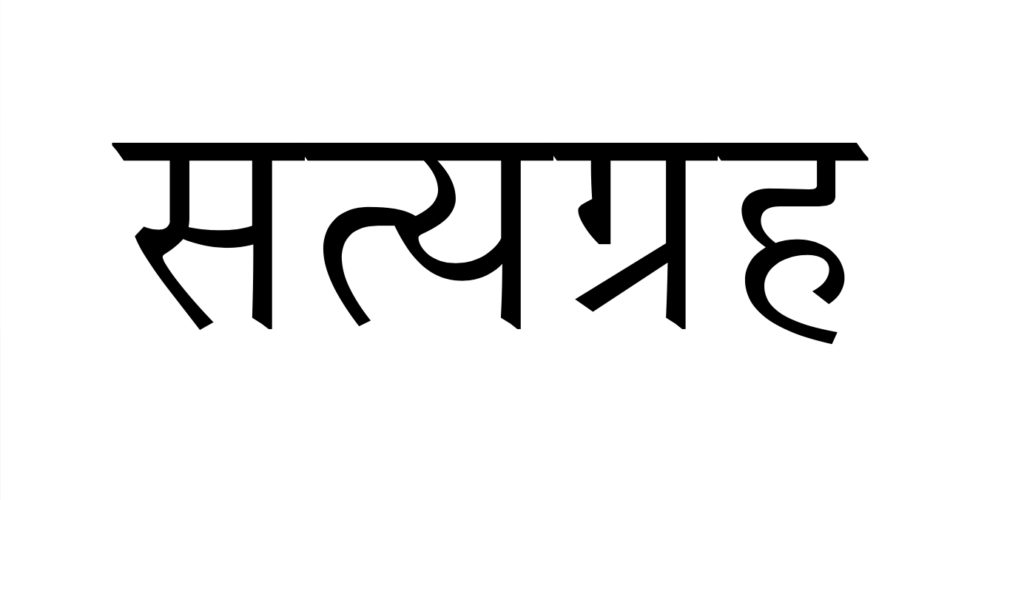
BLESSED ARE THE PEACEMAKERS
“BLESSED ARE THE PEACEMAKERS…”
When humanity, sharing, and tolerance become the ferment of a “bread of peace”.
Jean-Paul Veziano is a master craftsman and a baker based in the south of France. A legacy inherited from his father and his grandfather. For many years, he had nurtured a dream… that of bringing together baking artisans of the three monotheistic religions to knead dough together, from a little flour and water, and to shape “the bread of peace”.
A dream that eventually materialized with three fellow bakers: Ibrahim Abuhani of Rabat, a Muslim; Dany Avichail of Jerusalem a Jew, and himself Jean-Paul Veziano of Antibes, a Catholic.
February 2019: Israel was chosen as the land of link. For symbolism above all and history too: «Bread, water and salt are simple elements of universal food». That morning there was no mention of religion. These three men of different ages, but with identical hands crossed their eyes in respect of the work accomplished. Together, these artisans, in gestures handed down from the depths of the ages, each in their own culture, had the same sensations, the same satisfactions, the same pains, and above all the same passion for their craft… From this dough kneaded with three brotherly hands, they choose to shape a khamsa, a hand symbol of protection both Jewish and Arab, the hand of man, of the craftsman, stretched to the other. To “do good”. He extracts a pâton that, like a leaven of peace, will make emulators to swarm…
Indeed, the story does not end there… Back in France, Jean-Paul Veziano reshapes a dough in which it incorporates a piece of this dough kneaded together. Its purpose: to spread this love and passion throughout the world, to transmit know-how that like the good bread, connects all the humanity. The dough spread on the marble, he cuts with a cookie cutter, 8 grams pellets each, which he proposes to the craftsmen bakers and confectioners who so wish, to incorporate in their culinary creations to spread the peace across.
Today, 70 bakers across France and around the world have received, at their request, this little pastille by mail. You can also be part of this human chain by asking for the dough pellet, for your turn to slip it into a homemade bread or cake and follow the adventure on Instagram account @jeanpaulveziano.
A human history, very simple, that connects us, that is transmitted and shared, a fraternal history that we find in a bread, symbol of humanity, regardless of our cultures!
Marie Grippaudo
Yogendra Yadav arrested in Tiruvannamalai, India, en route to a meeting with farmers
KRISHNAGIRI, TAMIL NADU, INDIA, SEPTEMBER 08, 2018
“Finally, I have been arrested. My crime: wanting to meet farmers in their home. Where is rule of law?” the Swaraj India Party chief tweeted.
Yogendra Yadav, president of Swaraj India Party was arrested en route to a private meeting with farmers in Tiruvannamalai on Saturday.
“Finally, I have been arrested. My crime: wanting to meet farmers in their home. Where is rule of law?” he tweeted.
“With me two local farmer leaders ChandraKumar and Arul Arumugam have also been arrested,” he added in another tweet.
In an earlier tweet Mr. Yadav said, “I have refused to obey the illegal police order restricting me from meeting farmers at their home. I am proceeding to village Nammianthel. Let's see if TN police arrests me.”
“I called up the District Magistrate Kandasamy and said that no final order was issued as of now, and he agreed no order was issued.’ I asked, “How do they then forcibly enter lands and he said no such thing happening and that they were talking only to farmers who cooperated.”
Prof. Yadav said “I told him I was sitting with a farmer, whose house was forcibly entered into by the police,” and he denied of any police brutality and claimed that outsiders were trying to incite law and order issue.
According to Prof. Yadav, he had told him that he was an outsider with affected farmers, and that under the Constitution, he had the right to hold meetings with the farmers on their own property. “The Collector said, you have your freedom and police can’t stop you.”
However, within 5 minutes, “Our vehicle was surrounded,” he said. The activists were taken into the van that was to take them to the police station. “However, soon they realised who we were, and the vehicle was diverted to a wedding hall.”
According to Prof. Yadav, the Superintendent of Police arrived and said they had information that ‘over 100 farmers were meeting with him.’ “If I were to meet with 100 farmers in their own property, how is it illegal,” he asked.
"I have come to meet the farmers and I will not leave without meeting them,” he said. Along with Prof. Yadav, farmers leaders were detained. The SP has promised The Hindu that he would respond to queries on the issue shortly.

A message of hope coming from the hell of Venezuela
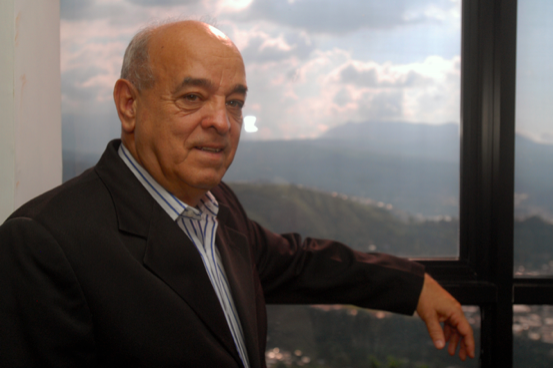
A message of hope coming from the hell of Venezuela
Francisco is a farmer and an academic. He is the director of the Centre for sustainable human development at Valle del Momboy University in Venezuela. He is a member of the RIEH and has sent to us the following text.
The crisis forces us to surpass ourselves by Francisco González Cruz
The crisis forces us to drastically change the way we live. On the one hand it imposes on us tasks for simple survival, habits that we never imagined to adopt. We spend time and money and have some painful moments in previously unknown steps. On the other hand, we are in the process of adopting other ways of being, living together, feeling and thinking. Long hours without light give time to be with our neighbors, to talk, to meditate or to listen to the silence. And also to suffer together. Or in solitude. We think of loved ones who are no longer. And of the previous times that were not as bad as we thought.
But there are also changes that were necessary even without the boost of the crisis, for deeper demands. The demons that have changed Venezuela to Hell are not all exclusive to this tropical country. The world is experiencing such great and rapid changes for which nature and man are not prepared. While poverty reduction is progressing, inequality is increasing, climate is warming, forests are shrinking and water is becoming scarce. At the same time, cupidity, authoritarianism and the concentration of power are growing. First of all, we need to be aware of the potential of the crisis. Opportunities to transform ourselves and transform what surrounds us. New ways to be, to live together, to feel and to think are necessary. Here and everywhere. Will we be able to link the need for personal and local change with global change?
Certainly will arise people much better than they were before. There will be worse, no doubt. But here, in the terrible circumstances we live, we can be reborn different. Instead of leaving for another country, we can transform ours. To make working, modesty and solidarity the new dominant values. We can invent new ways to live in the places where we live, to live with the neighborhood, to take care of the environment, to see and feel the reality. Perhaps a way to improve and amplify the conversations that are born in these moments of forced sharing without light or transport, where we are more human and we feel less fragile.
Transforming negative moods like fear and anguish is not an easy thing to do. But as they alter communication, solidarity and close the possibilities, we must find the way to transform them into positive soul states that open up the possibilities. Cultivate communities and networks, look for loved ones and friends, do things that we like and are useful. To make our territory a place of grace. The crisis forces us to change. Already we are different and "everything will be well".

Swate organizes women's event in Karur on March 8, 2018
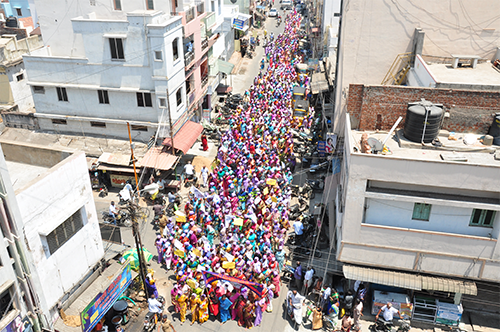
On the occasion of the 28th International Women's Rights Day, Swate (Society of women in Action for Total Empowerment), a women's organization member of RIEH, Tamil Nadu, India, organized a march in the town of Karur, the main settlement of its location area. This event brought together women from all castes, many of whom do not have the right to speak in traditional society.
Christina Sami, president of Swate and a very active member of the RIEH for many years, delivered a speech. The focus has been particularly on the fight against violence against women, against alcoholism, against land grabbing and the exploitation of river sand, for the employment of young people and for guaranteed remuneration for farmers.
The statement stresses that «The fundamentally responsible factor for such an alarming status is pervading corruption among the critical governance structures as well as institutions, judiciary and executive which devalue human dignity. The only possible solution is upholding the alternate political narrative which is people-centred and ecologically-tuned”.

New deal for our territories": an international Meeting on participatory local development
New deal for our territories": an international Meeting on participatory local development in Brittany. 14-15 June 2018
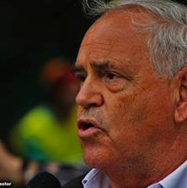
All over the world, people living in territories where the difficulties of living accumulate act collectively to face up and to take their destiny into their own hands.
The elected representatives of the country of Le Mené and the International Network for a Human Economy (RIEH) propose to some of those activists an international meeting on 14 and 15 June 2018 in Brittany, on the territory of Le Mené, to exchange and analyze the experiences of each one, convinced that we can learn from each other.
In Gao (Mali), the population is confronted with the conjunction of two major problems : security, since the area has been occupied for several months by jihadists and supporters of independence and poverty. Associations are mobilizing for peace and to respond to the needs of the population.
In Tamil Nadu, agricultural laborers and women, who are victims of discrimination as Dalits (untouchables), are educating themselves, claiming their rights, addressing justice, raising projects that generate income.
On the outskirts of Lima, Peru, the inhabitants of Villa El Salvador, an informal neighborhood, are organizing themselves to set up public services.
In the center of Brittany, a territory, Le Mené, threatened with desertification refuses to die, takes control by launching successive dynamics of endogenous and participatory development.
In Benin, the Songhai center has shown that agricultural productivity and environmental restoration can be reconciled by organizing an integrated system combining culture, livestock and fish farming, recycling waste and wastewater, producing its own energy, organizing the whole agricultural industry with processing and marketing. It is also a research and training center.
All these groups have in common a vision of the human being called to live in dignity, in solidarity, in harmony with the living.
Together with guests from different continents, we will seek to cross our experiences to define the conditions of change of model of development of a territory that would be based on local collective dynamics.
The meeting will be nourished by workshops of the participants, international speakers and common reflections.
For more information : contact@rieh.org

RIEH Benin, a very active group : meeting in Cotonou
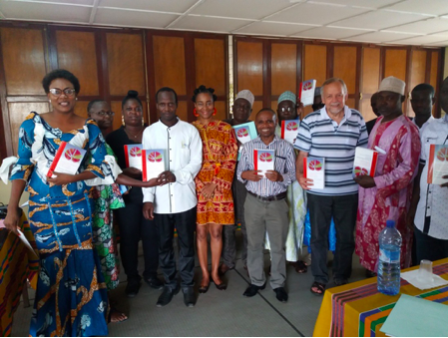
The RIEH group in Benin has a meeting on 11 April 2018 in Cotonou. He has chosen eleven actions for 2018 to be carried out by the various members and on which they will exchange and support each other.
These actions can be grouped around four thematics :
Agro-ecology and the Protection of nature
- Sensibilization of Boukombé producers on agro-ecology and food security
- Promotion of medicinal agro-ecological farms in Benin
Social entrepreneurship of young people
- Education for peace in Benin through the promotion of social entrepreneurship of young people
- Training of local elected representatives and business promoters of the BORGOU department on Entrepreneurship in the Republic of BENIN.
Promotion of girls and women: their health, their release and their economic empowerment
- Combating occult practices against women, female slavery and silent violence on gender
- Promotion of women's dignity in Muslim communities in Benin (by the Muslim community of BÉNIN)
- Diploma training for Women in the media
- Heart-to-heart with young girls and boys in school and female parents in the so-AVA community for their empowerment
- Well-nourished women and mothers, key to sustainable human development
Development of Eco-tourism
- Traditional Community Griots Training project
- Promotion of ecotourism and creation of green jobs in the commune of Gogounou, north Benin.
In the course of the meeting, will also intervene Grégoire Ahongbonon, who has created about 20 psychiatric patient reception centers in West Africa. Peopple suffering from psychiatric troubles are very often abused in villages and neighbourhoods. The association led by Grégoire receives them, establishes a diagnosis of their condition, treats them and facilitates their return to their environment.





